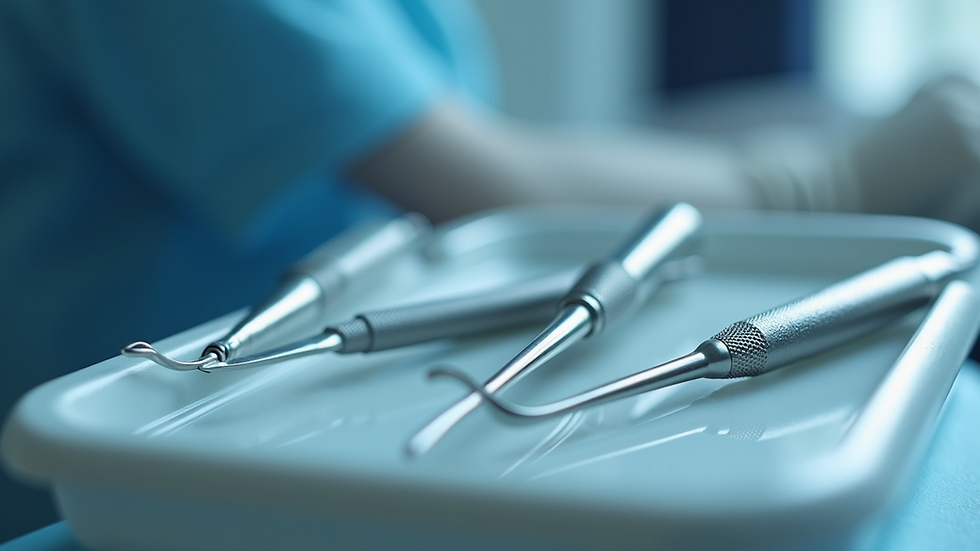Why Regular Checkups Keep Your Smile Healthy
- homedentyle
- Oct 13, 2025
- 3 min read
A bright, healthy smile is more than just a sign of good looks - it reflects your overall health and well-being. Regular dental checkups play a crucial role in maintaining that smile. Visiting your dentist consistently helps catch problems early, prevents serious issues, and keeps your teeth and gums in top shape. This article explores why regular checkups are essential and how they contribute to a lifetime of healthy smiles.
The Importance of Regular Checkups for Your Oral Health
Regular dental checkups are the foundation of good oral health. During these visits, your dentist examines your teeth, gums, and mouth to identify any signs of trouble. This early detection can prevent minor issues from turning into painful or costly problems.
Some key benefits of regular checkups include:
Early detection of cavities and gum disease: Dentists can spot decay and inflammation before they cause pain or tooth loss.
Professional cleaning: Plaque and tartar build-up that brushing misses are removed, reducing the risk of cavities and gum disease.
Monitoring oral health changes: Dentists track changes over time, such as wear, bite issues, or oral cancer signs.
Advice on oral hygiene: Personalized tips help improve your daily care routine.
By scheduling checkups every six months, you give your dentist the chance to keep your smile healthy and catch problems early.

Dental tools prepared for a routine checkup
What Happens During Regular Checkups?
Understanding what happens during a dental checkup can ease any anxiety and encourage you to keep appointments. A typical visit includes several important steps:
Medical history review: Your dentist asks about your health, medications, and any dental concerns.
Oral examination: Teeth, gums, tongue, and mouth tissues are checked for signs of decay, gum disease, or abnormalities.
Professional cleaning: A dental hygienist removes plaque and tartar using special tools, followed by polishing your teeth.
X-rays (if needed): These images reveal hidden problems like cavities between teeth or bone loss.
Treatment planning: If issues are found, your dentist discusses options and schedules follow-up care.
Regular checkups are not just about cleaning but comprehensive care to maintain your oral health.

Dental chair and equipment set up for a patient checkup
What is preventive dental care?
Preventive dental care focuses on stopping dental problems before they start. It includes daily habits like brushing and flossing, as well as professional services such as regular checkups and cleanings. The goal is to maintain healthy teeth and gums and avoid painful or expensive treatments later.
Some common preventive measures are:
Brushing twice daily with fluoride toothpaste
Flossing daily to remove plaque between teeth
Using mouthwash to reduce bacteria
Eating a balanced diet low in sugary snacks
Avoiding tobacco products
Regular visits to your dentist are a key part of preventative dental care. Dentists provide professional cleanings, fluoride treatments, and sealants that protect teeth from decay. They also educate patients on proper oral hygiene techniques.

Toothbrush and toothpaste prepared for daily oral hygiene
How Regular Checkups Prevent Serious Dental Problems
Many dental issues develop silently and worsen over time. Regular checkups help prevent these problems by catching them early. Here are some examples:
Cavities: Early-stage cavities can be treated with simple fillings. Without checkups, decay can reach the tooth pulp, requiring root canals or extractions.
Gum disease: Gingivitis causes gum inflammation and bleeding. If untreated, it can progress to periodontitis, leading to tooth loss. Professional cleanings remove tartar that brushing cannot.
Oral cancer: Dentists screen for signs of oral cancer during checkups. Early detection greatly improves treatment success.
Tooth wear and bite issues: Dentists monitor wear patterns and jaw alignment, recommending treatments like night guards or orthodontics if needed.
By preventing these problems, regular checkups save you from pain, complex procedures, and high costs.
Tips for Making the Most of Your Dental Checkups
To get the best results from your dental visits, consider these practical tips:
Schedule appointments every six months: Set reminders and book in advance to avoid missing visits.
Be honest about your habits and symptoms: Share any pain, sensitivity, or changes you notice.
Follow your dentist’s advice: Whether it’s improving brushing technique or scheduling follow-up treatments, compliance is key.
Maintain good oral hygiene at home: Brushing, flossing, and a healthy diet complement professional care.
Ask questions: Understanding your oral health helps you make informed decisions.
Regular checkups are a partnership between you and your dental team. Active participation ensures your smile stays healthy.
Embracing a Lifetime of Healthy Smiles
Regular dental checkups are a simple yet powerful way to protect your smile. They provide early detection, professional cleaning, and personalized care that keep your teeth and gums strong. Incorporating these visits into your routine, along with daily oral hygiene, supports your overall health and confidence.
Remember, a healthy smile is a lifelong investment. Make regular checkups a priority and enjoy the benefits of a bright, pain-free smile for years to come.



Comments